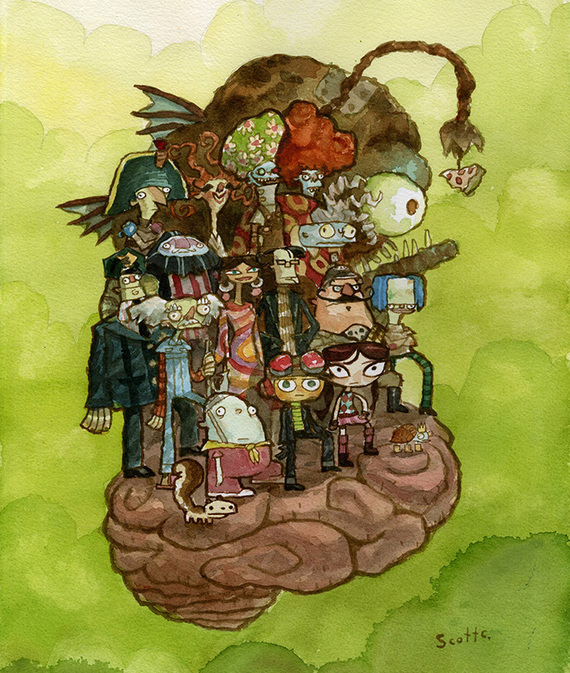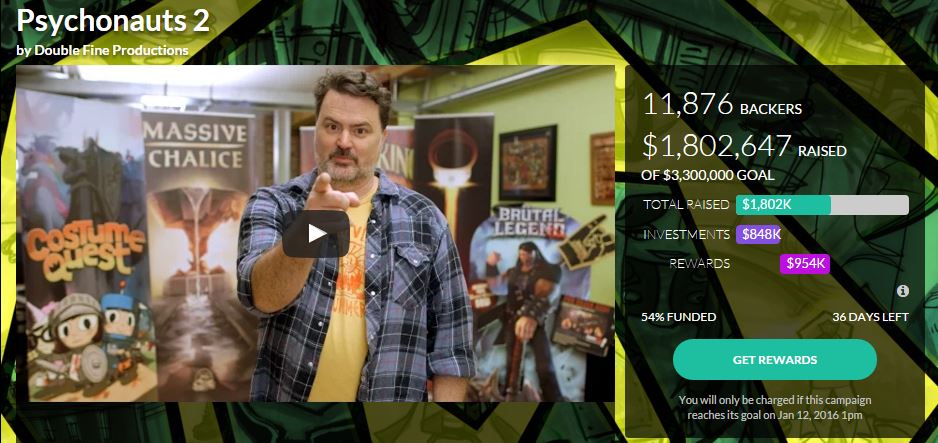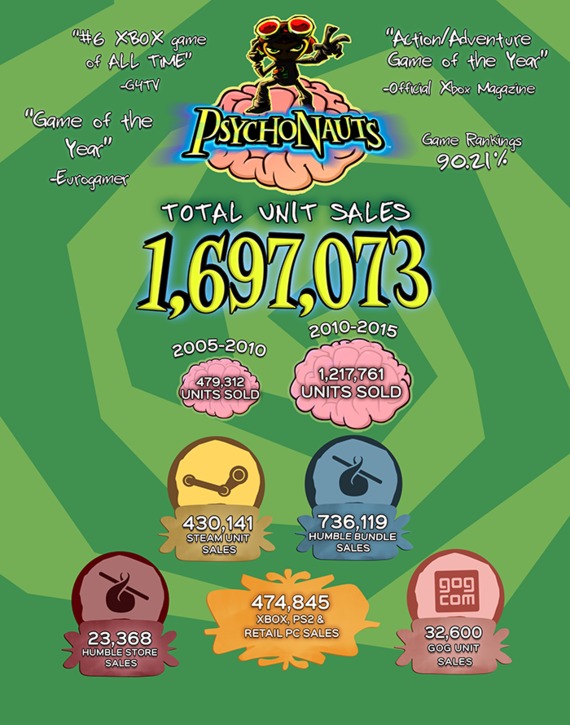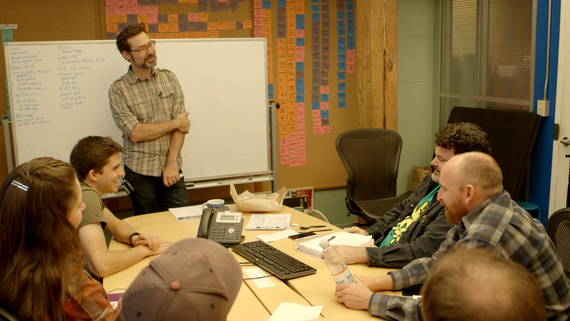A fair warning, a lot of law stuff is about to be spat out. If you have an aversion to that sort of thing, you might just want the highlights. That would be that the SEC (the US Securities and Exchange Commission) has ruled Fig a viable platform for investing in Psychonauts 2. That means that some of those who donated money to the Fig campaign for Double Fine’s long awaited sequel can see some return other than a copy of the game.
The long version? Well…
 The SEC has ruled that non-accredited backers (everyday, common people who’d back a Kickstarter or Fig) are allowed to invest in games on the Fig platform, instead of just back them. This means that Fig’s big “invest in games and turn a profit on them” thing can finally come to fruition. In a big press release sent out last week, Fig talked about the benefits of this announcement.
The SEC has ruled that non-accredited backers (everyday, common people who’d back a Kickstarter or Fig) are allowed to invest in games on the Fig platform, instead of just back them. This means that Fig’s big “invest in games and turn a profit on them” thing can finally come to fruition. In a big press release sent out last week, Fig talked about the benefits of this announcement.
Fig Game Shares
“With this qualification, Fig will be the first and only company to allow all fans the opportunity to support and earn a return based on a single game’s sales through Fig Game Shares. This qualification paves the way for Fig to create and register new Fig Game Shares for its other games.”
Fig is going to create shares called Fig Game Shares that will act as real stock market shares. Backers will invest in these, and potentially see a return on them based on the game’s sales number. It will be eligible for all Fig backed games going forward. For right now at least, Fig is the only platform that allows something like this, so don’t expect to make money off your donations on Kickstarter or Indiegogo.
 If you’re not interested in investing, then this doesn’t really apply to you. However, if you did back the campaign and are thinking about investment opportunities, there are a few things to keep in mind. There’s a video by Bitscreen that really illustrates these points, even though it’s nearly a year old.
If you’re not interested in investing, then this doesn’t really apply to you. However, if you did back the campaign and are thinking about investment opportunities, there are a few things to keep in mind. There’s a video by Bitscreen that really illustrates these points, even though it’s nearly a year old.
The Shill Game
In Pixel Burn – The Psychonauts 2 Shill Game, Bitscreen talks about why this is such shaky ground. He starts by pointing out Tim Schafer’s terrible history with financing, all the way back to the first Psychonauts. He also mentions how Schafer is on Fig’s board of advisors, and that Fig itself was founded by former Double Fine COO Justin Bailey. You could understand how there might be a conflict of interest.
The most important thing he goes over though is this investment business. At the time, this SEC announcement hadn’t happened, but most of his points still hold true. Take for instance how many copies Double Fine says they sold of Psychonauts, about 1.7 million. It’s a cult game now, but it never sold well back in the day, pushing just 100,000 copies in its first year. In fact, Microsoft was originally going to publish Psychonauts but backed out because it was going so far over budget. Majesco ended up publishing it, but almost went out of business as a result.
That 1.7 million figure comes almost entirely from sales and discounts (which means it’s making less money). It also includes ports to countless platforms over a decade and Humble Bundle, which allows customers to pay however much they want for games, as low as $1.
 You’ll also only be investing directly in Psychonauts 2. You won’t see a penny from any potential merchandise from the game. Nor will you be making money off sales of the original Psychonauts or the also upcoming Psychonauts: Rhombus of Ruin as a traditional investor would expect.
You’ll also only be investing directly in Psychonauts 2. You won’t see a penny from any potential merchandise from the game. Nor will you be making money off sales of the original Psychonauts or the also upcoming Psychonauts: Rhombus of Ruin as a traditional investor would expect.
Investing In What?
Also take into consideration the timing. There’s a reason why we’re using seemingly random screenshots throughout this article. It’s because Double Fine have shown nothing of Psychonauts 2 in all this time. Double Fine say the game will be done in 2018, but it could be later than that knowing them. And as Bitscreen points out (as an example), Psychonauts 2 must sell 670,000 copies at a sale price of $21 for the game to break even, only then will investors see any money. Even then, you’ll only be breaking even.
That means if you were to invest today, it would take at least three years, possibly as many as five to break even. It could then take as long as a decade to make any significant profit, which you’d only see trickle in slowly over all those years.
 This is all the best case scenario though. Comparatively smaller and less publicized games like the upcoming Trackless or the barely funded Outer Wilds may never make a profit. Fig sounds like it could be a good idea, on paper, buried in somebody’s filing cabinet. But in practice, Psychonauts 2 brings Fig’s inherent flaws to light. There’s the already massive risk of competing against Kickstarter and Indiegogo. But having to deal with the every day backer who’s also an investor could spell trouble. It’s only a matter of time before a Fig game fails to deliver and somebody decides to sue, and they won’t be seeking their donation back, but their investment.
This is all the best case scenario though. Comparatively smaller and less publicized games like the upcoming Trackless or the barely funded Outer Wilds may never make a profit. Fig sounds like it could be a good idea, on paper, buried in somebody’s filing cabinet. But in practice, Psychonauts 2 brings Fig’s inherent flaws to light. There’s the already massive risk of competing against Kickstarter and Indiegogo. But having to deal with the every day backer who’s also an investor could spell trouble. It’s only a matter of time before a Fig game fails to deliver and somebody decides to sue, and they won’t be seeking their donation back, but their investment.
Don’t be lured in with all the talk of making tons of money. If you just want to back a project without investing in it, awesome! But if you’re thinking about becoming an investor in a game, maybe think twice about taking out a loan on for that yacht.




there was a bit I noticed in the pages for “Make Sail” and “Wasteland 3” On Make Sail, it says investment returns are limited to 3x total funding or 3 years, whichever comes first. And Wasteland 3 says returns are limited to any time up to 3 consecutive months of sales dropping below $10,000… … …does each one get to make their own rules about when they quit?
[…] Fig is having. The launch of multiple campaigns, including Wasteland 3, and, more importantly news that the platform now has the ok to accept a broader range of investments for Psychonauts 2. […]
[…] Fig a viable platform for non-accredited investments. Now that backers were legally permitted to invest in crowdfunded projects it was only a matter of time before other platforms joined the bandwagon. This month, Indiegogo has […]
The “fine print” of the SEC filing is pretty insane at how little protection any “investor” gets. There are literally a million legal ways that a developer can screw over investors, especially the unaccredited guys.
STEER CLEAR. ;D